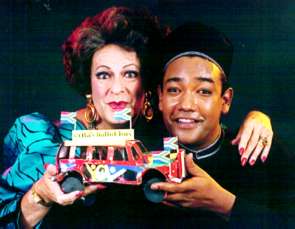![]()
|
South Africa's version of RuPaul takes on politics
in 1999 elections (continued) Part 2 of 4 For a printer-friendly version of this story, click here. |
|||||
|
Some analysts say a low voter turnout on June 2 could give the ANC a two-thirds majority in Parliament and the power to change the constitution. While Mandela and Mbeki have denied charges that the ANC wants to rewrite the constitution, there is fear in some quarters that South Africa might follow the path of many African countries, such as Zimbabwe, that are ruled by increasingly oppressive parties with an ultra-majority over the opposition. Other analysts are confident that South Africans of all stripes are prepared to defend their nascent democracy. "There are only three to four percent (of votes) that separate us from a country where the government could rewrite the constitution," said Tom Lodge, research director at the Electoral Institute of South Africa. "But even if they got that two-thirds, there is still the one-third and a substantial civil society. This isn't Zimbabwe." With her bouffant hair, sugary smile, long red nails, and love of sequins, Evita may seem an unlikely spokesperson for multiparty politics. But South Africans have been swallowing Evita's sugar-coated pill of political awareness for 20 years. Uys said Evita has been around so long, people think of her as a real person. After a show at his dinner theater an hour outside of Cape Town recently, Uys removed Evita's wig, heavy makeup and tent-shaped dress, put on a tank top and shorts and sat down at a table to talk about Evita, the upcoming elections and the future of democracy in South Africa. Uys, 54, is the gay son of an Afrikaner father and Jewish mother. He has written 44 plays, as well as books, newspaper articles and TV and radio projects, many of them taking satirical and critical look at South African politicians and policies. His alter ego was born in the late '70s, when he found most of his work banned by the Apartheid government. He was writing a weekly newspaper column, but the government censors wouldn't allow him to say anything critical of Apartheid. So he created Evita as a fictional character in his newspaper column to say those things for him. She started out as the gossipy wife of a National Party insider. Uys would write that he ran into her a party, and she would say, "Darling, have you heard?" She would then recount stories of corruption and mismanagement in the government ranks. To his surprise, Uys got away with it, and he brought Evita to life in the theater in 1981. Since then, Evita's life has transformed with the nation. Before the end of Apartheid, she was the ambassador to a fictional black homeland Bapetikosweti. Her commentary pointed out the hypocrisy of the homeland system, according to which black people (75 percent of the population) were forced to live on designated tribal land (13 percent of the country's total land area). Now, she's President Nelson Mandela's unofficial Afrikaner hostess at state banquets, and she says she was secretly part of the struggle against Apartheid. Over the years, Uys's critics have spied on him, tried to poison his pets and threatened to kill him. But Evita was undeterred. |
|
||||


